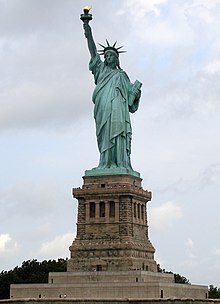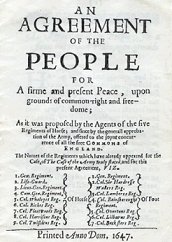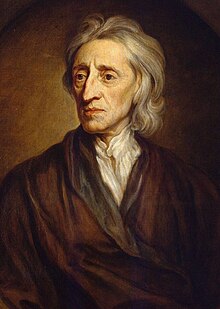Liberalism
Liberalism is a political, social and economic doctrine. In the social sphere, he defends individual freedom, equality before the law and the limitation of the powers of the State. Economically, he advocates private initiative and the free market. As a vital attitude, he proposes tolerance.
It represents very heterogeneous currents, with many forms and types of liberalism, but in general it defends the secular State; individual rights —such as the right to property, freedom of association, freedom of religion, and freedom of expression—; the free market or capitalism; the equality before the law of every individual without distinction of sex, sexual orientation, race, ethnicity, origin or social condition; and the rule of law or rule of law to which rulers must submit.
Contemporary liberalism arose in the Enlightenment and quickly became popular among many European philosophers and economists and later in society at large, especially among the bourgeoisie. The liberals sought to eliminate the absolute monarchy, noble titles, the confessional nature of the State and the divine right of kings and found a new political system based on representative democracy and the rule of law. The liberals ended mercantilist policies and trade barriers, promoting free trade and free markets. The leaders of the French Revolution and the American Revolution used liberal philosophy to defend the rebellion against the absolute monarchy. In the 20th century, fascism and communism were popular ideologies that openly opposed liberalism and overshadowed it throughout the century, other ideologies also arose that were considered as a middle way between liberalism and statism.
Liberals have several ramifications. The ideas of classical liberalism from the 17th to the 19th centuries—the adjective "classical" was added after the fact by political theorists after the decline at the end of the century XIX of this liberalism of individual liberties and free market economy—were recovered and rethought in the XX century by libertarians, who are present mainly in the United States and the rest of America. In Europe, the so-called liberal-conservatives, who are called that way because they advocate less moderate reforms, are usually one of the branches less notable. A divergence between the Anglo-Saxon and French liberal traditions has also been noted; Anglo-Saxon liberalism seeks to limit the power of the State, while French liberalism seeks a strong State that guarantees equality before the law and the elimination of privileges.
Definition
It is identified as a doctrine that proposes freedom and tolerance in human relations. Promotes civil and economic liberties, opposing absolutism and conservatism. It constitutes the current on which both the rule of law and representative democracy and the division of powers are based.
Since its first formulations, liberal political thought has been based on three main ideas:
- Human beings are rational and possess inviolable individual rights, including the right to set up one ' s own life in the private sphere with full freedom, and the rights to property and the pursuit of happiness. This is based on John Locke's three natural rights: life, liberty and private property.
- The government and, therefore, the political authority must result from the consent of free persons, having to regulate public life without interfering in the private sphere of citizens.
- The rule of law compels rulers and governors to respect the rules, preventing the arbitrary exercise of power.
Liberalism was a movement of wide projection (economic, political and philosophical) that defended as an essential idea the development of individual personal freedom as a way to achieve the progress of society.
Mainly advocates for:[citation needed]
- The development of individual rights and, from these, the progress of society.
- The establishment of a rule of law, where all persons are equal before the law (formal equality), without privileges or distinctions, in compliance with the same minimum framework of laws that safeguard the freedoms and well-being of persons.
Liberalism is inspired in part by the organization of a rule of law with limited powers —which ideally would have to reduce government functions to security, justice, and public works— and subject to a constitution, which allowed the emergence of liberal democracy during the 18th century, still in force today in many current nations, especially those of the West.
European liberalism of the 20th century has placed great emphasis on economic freedom, advocating the reduction of economic regulations public and the non-intervention of the State in the economy. This aspect of liberalism was already present in some liberal currents of the XIX century, opposed to absolutism and advocated promoting the economy of market and the progressive rise of capitalism. During the second half of the XX century, most of the European liberal currents were associated with what is commonly known as the political right.
It should be taken into account that liberalism is diverse and there are different currents within political movements that describe themselves as "liberal"
Features
Its main features are:
- Freedom as an inviolable right that refers to various aspects: freedom of thought, worship, expression, association, press, etc., whose only limit is not to affect the freedom and the right of others, and which must constitute a guarantee against the government's intrusion into the lives of individuals.
- The principle of equality before the law, referring to the legal and political fields. That is, for liberalism all citizens are equal before the law and before the State.
- The right to private property as a source of development and individual initiative, and as an unalterable right that must be safeguarded and protected by law.
- The establishment of civil codes, constitutions and institutions based on the division of powers (Executive, Legislative and Judicial), and the discussion and resolution of problems through assemblies and parliaments.
- Freedom of worship and separation from the State and church in a secular state.
- Non-politicization of government posts, and other public elements, such as education (both school and university), health and justice.
- Tolerance in the application of individual or collective autonomy.
Social and economic liberalism
Liberalism usually includes two aspects: the social and the economic. Social liberalism, also called cultural liberalism, is strongly in favor of the secular state. Social liberalism opposes the interference of the State in the private life or in the personal decisions of citizens and also emphasizes the freedom of people in terms of cultural norms or traditions, opposing conservatism. In this way, social liberalism defends full sexual, expression and religious freedom, as well as the different types of consented social relationships, whether friendly, loving or sexual.
Social liberalism believes that the state should not impose a standard of living or any specific code of behavior, and is seen as a political ideology defending the rights of those who do not conform to cultural norms or traditions and they are in favor of them expressing their personality, as long as they don't hurt anyone. For social liberalism, all models or lifestyles must be respected, and states that as long as they do no harm, no model or lifestyle will be better than another.
Economic liberalism is the application of liberal principles in the material development of individuals, such as the non-interference of the State in commercial relations between citizens, promoting the reduction of taxes to its minimum expression and reduction of the regulation on trade, production, etc. According to liberal doctrine, the non-intervention of the State ensures equal conditions for all individuals, which allows a framework of competition to be established, without restrictions or manipulations of various kinds. This means neutralizing any type of public benefit, such as tariffs and subsidies, in favor of the profit of each person through work, favoring meritocracy and production.
The dissolution of government and the right to resist: Locke, Kant and Rawls
For John Locke, society is a human creation, that is to say by consent, due to which it can choose its rulers. However, since the members of society, or, in other words, the members of the body politic decide whom to elect, for how long and under what conditions, if those who govern contravene the principles of government and the rights of the people, the power must return to its original hands. According to Locke, the people are not obliged to obey when the rules are broken. However, Locke does not posit resistance as a natural right, but rather as a certain possibility that every government must deal with. For him, "the people do not rise up over trifles, and are capable of tolerating a large number of injustices. Only when the violations of the law or the purposes of society are perpetuated over time, the peoples resist".
Another classical liberal thinker was Immanuel Kant, who also studies the making of society, freedom, and subjection to government. For Kant, freedom is directly related to the right of the individual to obey only those laws in which he sees his own legislative will reflected. Up to this point he seems to agree with Locke, but although the people are a sum of wills that agree for a better way of life, «the ideas of general will and contract do not imply, in this framework, the recognition of inalienable rights of the people, but are assumed, in any case, as criteria that allow the legislator to dictate laws such that could have been accepted by the united will of an entire people”.
Although the people have rights, these can and should be alienated at the moment a government is formed, even when it becomes its representative who can design and execute laws thinking about its well-being. Hence, «For a law to be considered legitimate (and to be able to claim the consent of those who submit to it), it is not necessary for the people gathered in assembly to dictate said law, nor it is necessary that he give his effective consent: if a law is of such a nature that it is impossible for an entire people to give its approval, then it is not legitimate, but as long as it is only possible that the people ever gave their assent to said established law, then it can be considered just".
Then, in order to have a fair government, those who elect it must know the qualities and capabilities of their chosen ones, because according to Kant, once elected, there is no going back. Did liberalism lose something? That's right, the possibility of civil disobedience.
Now, is civil disobedience applicable in contemporary times? What do the new standard-bearers of liberalism say?
Faced with the social problems of injustice, poverty and inequality, some scholars of the social sciences have raised liberalism as a way out or resolution. They maintain "that the situations of extreme poverty and misery existing in the countries of the underdeveloped world constitute a problem of global economic justice." One of the proposals of John Rawls, the greatest exponent of current liberalism, is the implementation of social assistance policies, but in no way change the economic system.
According to Rawls, current social problems have nothing to do with international economic structures, rather they are local problems that internal governments have been incapable of solving.
Contrary to most classical thinkers, who seek to explain the sociopolitical conditions of their time, contemporary thinkers such as Rawls seek to justify the current economic system. Thus, we find ourselves with two positions: one that defends the position of the people and another that defends the position of the government. One of the most relevant conceptual challenges in liberal theory is the dichotomy between freedom and justice and the way in which they interact to achieve the common good.
Theories of the social optimum: Benthamian and Paretian liberalism
A less famous but more rigorous division is the one that distinguishes between the liberalism preached by Jeremías Bentham and Wilfredo Pareto proposed two other conceptions for the calculation of an optimum of social satisfaction.
In the economic calculation several currents of liberalism are differentiated. In classical and neoclassical theory, the theory of homo œconomicus is frequently used, a perfectly rational being with a tendency to maximize his satisfaction. To simulate this fictitious being, the Edgeworth-Pareto graph was devised, which allowed knowing the decision that an individual would make with a given preference system (represented in indifference curves) and given market conditions. That is, in a certain equilibrium.
However, there is great controversy when the satisfaction model has to be transferred to a certain society. When it comes to creating a graph of social satisfaction, the Benthamian and the Pareto models collide head-on.
According to Wilfredo Pareto, the satisfaction that one person enjoys is absolutely incomparable with that of another. For him, satisfaction is an ordinal and personal magnitude, which means that it cannot be quantified or related to that of others. Therefore, a graph of social satisfaction can only be made with a given income distribution. You could not compare different distributions in any way. On the contrary, in Bentham's model men are essentially equal, which leads to the comparability of satisfactions and the elaboration of a single graph of social satisfaction.
In the Pareto model, a society reached the maximum possible satisfaction when it could no longer give anything to anyone without taking something from another. Therefore, there was no optimal distribution of income. An optimum of satisfaction of an absolutely unequal distribution would be, at the social level, as valid as one of the most absolute equality (provided that these were found within the Pareto optimum criterion).
However, for egalitarians like Bentham, not just any distribution of income was worth it. The fact that humans are essentially the same and the comparability of satisfactions necessarily led to a finer optimum than the Paretian one. This new optimum, which is necessarily one of the cases of the Pareto optimum, arises as a necessary logical conclusion of the law of diminishing returns.
Main contemporary currents

Liberalism, originally, defends individual and economic freedom, being reluctant to a strong state (anti-statism) and to tax citizens with high taxes. However, from this doctrine, numerous variants have emerged. Following are the main manifestations of contemporary liberalism, organized from least to most regulated (from accepting a certain level of government, to not accepting it at all):
- Libertarism: libertarians defend a political ethic based on the right to private property and the non-initiation of force as the basis of individual liberties, also promote free market capitalism as a characteristic expression of individual freedom. Among its best-known variants are the one that defends a constitutionally limited government and a minimum state, and a form of philosophical anarchism that promotes law and private security or voluntary government.
- Minarquism: This movement defends the minimum state, that is, that a minimum government is necessary to preserve freedom, but restricting itself to its minimum functions of "vigilante" (mainly courts, police, prisons, and defense forces, see: Night watch state), without intervening in the economy, accepting taxes only for very particular cases.
- Anarcocapitalism (also called voluntarism): promotes the sovereignty of the individual and rejects the main quality of a State, its imperative and coercive capacity. This is a political-philosophical system where individual agents freely determine the economic and social structures to which they subscribe. A common error outside the academy, derived from its denomination, is the widespread belief that such a system requires adopting a business-working role or a specific structure. Anarch-capitalists are not opposed to any political formulation or way of life provided that this is voluntary and not imposed on individuals. In short, it does not establish organizational forms but coactive absence under the principle of non-aggression.
- Socio-liberalism: defends the compatibility of individual freedom with the State and social well-being and development. For this movement, the role of the State is to ensure equal opportunities by avoiding abuses and monopolies, and by promoting personal development and the freedom of all citizens, but in no case by replacing them in decision-making.
*Note: neoliberalism has been omitted from this scale, since its distinctive criterion is not ideological, but chronological (although there are divergent opinions, the most general meaning is that it is the same traditional liberalism, adapted to the current time).
Contenido relacionado
Modus tollendo tollens
Epicurus
Anaxagoras




